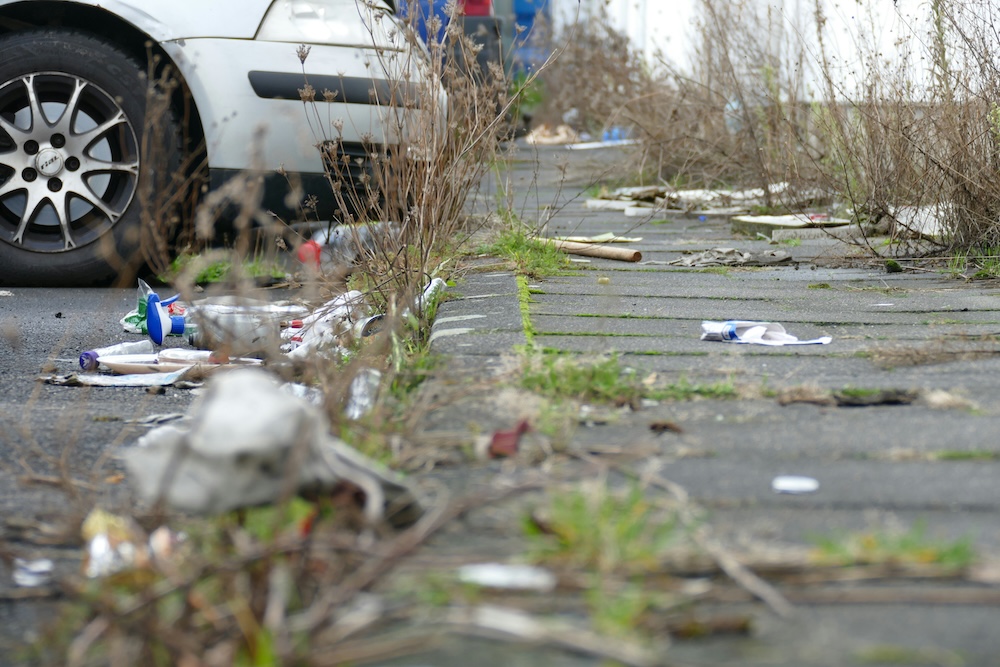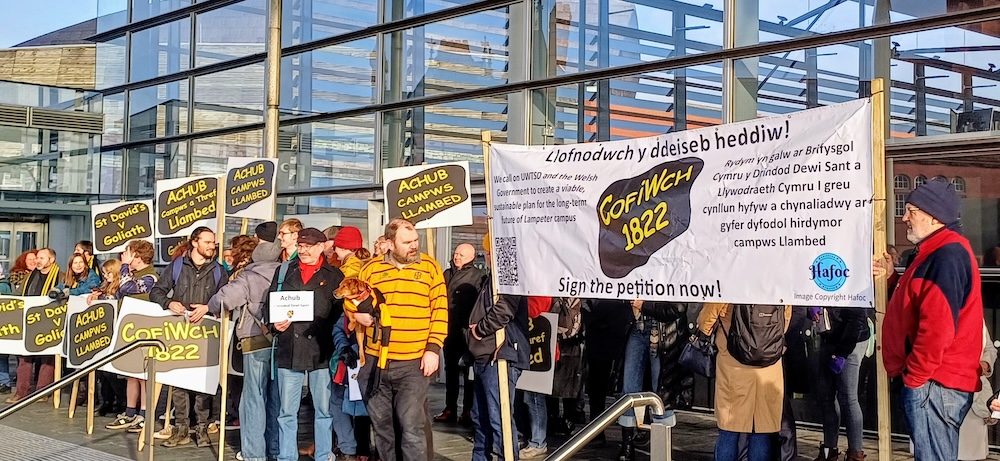With a shocking increase in dirty streets in Wales, Alex Myles argues that a meaningful behaviour change campaign from government is required to tackle the scourge of litter and fly-tipping across our communities.
Littering in Wales has reached a crisis point.
In its most recent annual report, Keep Wales Tidy highlights a shocking increase in dirty streets with a 286% rise in the number of streets graded D – the worst possible rating for cleanliness. The enormous rise is attributed to a marked increase of “on the go” food and drinks packaging and pressure on council cleaning budgets.
Walking the streets of inner-city areas like Roath, Cathays and Splott in Cardiff, litter and fly-tipping is a frighteningly common sight and the situation does not seem to be improving. Innately an environmental issue, it is also a social justice one. Keep Wales Tidy reports that build-up of litter has a disproportionate impact in deprived areas of the city, where poorly maintained areas are exacerbating health inequalities, increasing crime and diminishing community pride.
Areas of Cardiff worst affected by litter surround high streets overrun by takeaway outlets offering cheap, unhealthy products that come with unnecessary amounts of packaging. Coupled with a lack of investment from councils, thanks to years of austerity and ever-increasing demands on social care and education, litter is blighting communities not just in the capital but across the country.
Walking the streets of inner-city areas like Roath, Cathays and Splott in Cardiff, litter and fly-tipping is a frighteningly common sight and the situation does not seem to be improving.
Our collective attitude towards litter can also help to explain where we are today. Many do not see littering as an offence or an act of disrespect, but simply the most convenient option – an option with little to no consequence thanks to weak enforcement. Keep Wales Tidy’s equivalent, Keep Scotland Beautiful, points to the personal, social and material factors that cause littering, all of which interact. These include a lack of respect for the local area, thinking it is normal to litter and living in a run-down, already littered neighbourhood. There are also more practical concerns, like a lack of public bins and adequate refuse infrastructure.
Unlike Britain, public cleanliness is a virtue that is ingrained in other nation’s cultures – as demonstrated by the efforts of travelling Japanese football fans in international tournaments. In Singapore, citizens regard the act of littering as a significantly anti-social act. The state had considerable intervention in promoting Singapore’s now pristine image. Cleanliness was to reflect the government’s zero tolerance approach to corruption – which ravaged the nation’s South East Asian neighbours in their respective journeys to independence. Introducing the now-annual Keep Singapore Clean initiative in 1968, then Prime Minister Lee Kuan Yew saw cleanliness and national pride as two sides of the same coin. As environmental conditions improved, foreign investment and economic growth soon followed.
Syniadau uchelgeisiol, awdurdodol a mentrus.
Ymunwch â ni i gyfrannu at wneud Cymru gwell.
While not advocating for the more draconian elements of Singaporean environmental health policy – it seems one must reference the infamous ban on imports of chewing gum in 1992 – enforcement is routine and visible. This is evidently not the case in Wales. The issuing of fixed-penalty notices from Welsh local authorities has dropped off a cliff – from a high of nearly 30,000 in 2016-17 to a meagre 1,000 in 2023-24. That is the equivalent of each council issuing just one notice a week.
There seems to be political will behind tackling the issue. In a legislative proposal put to the Senedd, MS for Pontypridd Mick Antoniw advocated for a Bill on tackling littering and fly-tipping, with a focus on strengthening and re-imagining enforcement action. This includes driving licence and vehicle confiscation for repeat in-transit offenders and introducing an environmental awareness course, similar to what is offered to motorists who exceed speed limits. The proposal received cross-party support when debated in the Siambr earlier this year. While it is unlikely the proposal will manifest into a Bill this Senedd term, a newly set-up Cross Party on Littering, Fly-Tipping and Waste Reduction are preparing manifesto proposals for “all parties” to use ahead of next May’s elections.
While greater and more creative enforcement is needed, it is unlikely that local authorities – without a significant cash boost – can administer such a regime. Already struggling to pay for the cost of waste disposal, some councils have reduced the opening hours of disposal centres, no doubt a factor as to why bulky items are fly-tipped or simply left outside properties. As well as accessibility, councils also face barriers around identification; councils can only issue fines to known offenders.
Many do not see littering as an offence or an act of disrespect, but simply the most convenient option – an option with little to no consequence thanks to weak enforcement.
Another solution – shifting the responsibility of litter on to the producer of waste, has been mooted. The Welsh Local Government Association – a collective voice of Welsh local authorities – has called for the Packaging Extended Producer Responsibility (pEPR) to extend to litter, placing the cost of dealing with packaging litter on the companies that produce it. While shifting the cost of litter to the producer can incentivise less packaging to enter the eco-system and in turn save councils money, this does not directly prevent the act of littering. Regulation and legislation is also overly bureaucratic and takes a considerable length of time to push through.
We talk often about the need to focus on prevention rather than cure to the point of cliche. Yet, we must tackle the root cause of litter and that is people littering. While the ban on single-use vapes, pEPR and a Deposit Return Scheme – with glass included – are important parts of the toolbox, regulation is not enough on its own to address the scale of the problem. A government-led behaviour and public education campaign must be put in place.
Current advertisements around recycling in Wales are rather convivial. The crux of these adverts seem framed around the ‘doing good’ part of recycling, mainly for the wider environment’s sake. Messaging around littering needs to be stronger and more authoritative; reinforcing residents’ sense of civic duty to keep local areas tidy and that littering is an offence, punishable by fixed penalty notices.
Gofod i drafod, dadlau, ac ymchwilio.
Cefnogwch brif felin drafod annibynnol Cymru.
Messaging must be targeted in areas where littering and incorrect, even illegal, disposal of waste is more persistent. Letters, flyers, email communication, ideally available in a household’s primary language, can be distributed together with a public messaging campaign across traditional and digital media. Think of posters and billboards, public transport advertising together with television and online adverts of the THINK! mould – the highly successful Department for Transport campaign around road safety. Together with an army of cleaners, the use of mass media was essential to the success of the Keep Singapore Clean campaign, with posters and banners displayed in shops, community centres and bus shelters.
Taking a trip to Barry Island during the July heatwave, it was a pleasant surprise to hear a tannoy announcement reminding seaside revellers of their responsibility not to litter. The broadcast referred to enforcement officers and the issuing of fixed penalty notices as deterrents. Similar announcements can therefore be broadcast in public spaces like city parks in peak times.
Much like areas of Cardiff, Barry Island has been plagued by litter – with the clean-up of beaches presenting an enormous cost to the Vale of Glamorgan council. The cost to the taxpayer of local authority litter operations must be central to messaging. This is money that could be spent on bus services, community amenities, and schools. Education is another key part of the puzzle. It is therefore encouraging to see Keep Wales Tidy’s school programmes helping to embed good environmental practice as a civic duty.
Simply put, it is unsustainable and irresponsible to rely on councils and volunteer groups to pick up our mess. With councils struggling and legislation often too complex and time-consuming, the next government – in partnership with schools, universities and student bodies, housing associations and letting agencies, community leaders and more – must promote a change in our collective psychology, learning from international examples like Singapore.
Messaging around littering needs to be stronger and more authoritative; reinforcing residents’ sense of civic duty to keep local areas tidy and that littering is an offence, punishable by fixed penalty notices.
Going by the number of related posts on my local Facebook community group and considerable volunteer efforts in the area, littering clearly matters to people. Approaching a crucial election period, parties and candidates from across the political spectrum could do a lot worse than making the issue a key commitment to their pitches to voters across Wales’ new mega-constituencies.
Existing members and new candidates must also be cognisant that littering is a product of a lack of pride in one’s local environment. Litter is hard to come by in the more affluent northern suburbs of the capital. It therefore must be regarded as a social justice issue as well as an environmental one, with meaningful investment in more deprived communities being a crucial part of preventing littering activity and restoring community pride, in turn making our more disadvantaged neighbourhoods better places to live.
It is high time we threw the same energy and efforts into tackling and changing attitudes to littering like what was done around drunk driving, smoking, and even recycling. With the tools fully at our disposal, Wales can take the lead – learning from and inspiring other nations along the way.
All articles published on the welsh agenda are subject to IWA’s disclaimer. If you want to support our work tackling Wales’ key challenges, consider becoming a member.





